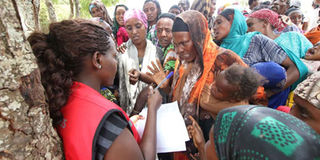Kenya’s refugee policy cries out for rethink

A Kenya Red Cross official at Sessi camp in Moyale takes a record of the refugees fleeing Ethiopia. Kenya’s policy is inadequate to address the evolving nature of the refugee definition and circumstances. FILE PHOTO | NATION MEDIA GROUP
What you need to know:
Uganda, which shares a border with Kenya, has also reported an overwhelming influx of refugees from the DRC.
Kenya is considered an island of peace and tranquillity in the greater Horn of Africa.
The closure of Dadaab and repatriation of Somali refugees back home has been on Kenya’s agenda since 2013.
A new wave of refugees from Ethiopia began arriving in Kenya on March 10 as the Oromo people flee persecution in their home country and settle close to the border town of Moyale.
The number is estimated at 9,600 and rising.
Uganda, which shares a border with Kenya, has also reported an overwhelming influx of refugees from the Democratic Republic of Congo following clashes in Ituri earlier this year.
It is only a matter of time before Kenya starts to experience the spill over of these refugees due to overpopulated camps in Uganda.
RETHINK POLICY
The growing refugee population as fresh waves of refugees stream into Kenya warrants a serious think about the direction the country’s refugee policy should take.
Kenya is considered an island of peace and tranquillity in the greater Horn of Africa comprising of the troubled Somalia, South Sudan, Ethiopia and Eritrea and the majority of these refugees are hosted at Dadaab and Kakuma camp. A United Nations High Commissioner for Refugees (UNHCR) report says 486,460 refugees were resident within Kenya’s borders as at January.
SOLUTIONS
Three durable solutions for refugees promoted by the UNHCR are resettlement to a third country, local integration into the host country and repatriation to their homeland.
Most refugees in Kenya are in a protracted situation, partly because of the failure of these solutions and the shortcomings of our refugee policy. The Refugee Act 2006 has been under review since 2011.
Resettlement in a third country accounts for only 1 per cent of the world’s refugee population. A small number of states participate in the programme and the quotas are too small. The quotas in Sub-Saharan Africa are even smaller, leaving a minute fraction of places for refugees in Kenya.
DADAAB CLOSURE
The closure of Dadaab and repatriation of Somali refugees back home has been on Kenya’s agenda since 2013.
Five years on, the camp is open with voluntary repatriation wobbly.
Local integration means refugees are granted legal residency with prospects of eventual citizenship but Kenya lacks the policy framework.
Kenya’s policy is inadequate to address the evolving nature of the refugee definition and circumstances.
Nobody would have predicted in 1991 that the conflict in Somalia would persist for 27 years. If history has taught us anything, it’s that the arrivals from Ethiopia could be the genesis of a larger wave.
The encampment policy enacted in 2012 has largely failed because it was a rushed and politicised.
REFUGEE RIGHTS
It took away a refugee’s right to pursue work opportunities and freedom of movement, directly contravening Articles 17 and 26 of the 1951 Refugee Convention.
The policy failure has led to the emergence of self-settlement, whereby refugees opt out of the camps to live in urban and rural areas.
The Intergovernmental Authority on Development (Igad) meetings in Mogadishu and Nairobi in 2016 and 2017, respectively, were a step in the right direction.
Spearheaded by Kenya, the discussion centred on a comprehensive regional approach in delivering durable solutions for Somali refugees whilst promoting sustainable integration of returnees.
In 2016, the ONE data Report, which tracks official development assistance flow of the major donors, showed that Europe spent more aid within its borders than overseas. This means Kenya must take on more responsibility for the refugees within its borders.
That calls for the revival of the Refugee Act (Amendment) Bill, presented to Parliament twice in 2016 with no progress.
Ms Maina is a humanitarian diplomat based in Kenya. [email protected]




